Is it true what they say that guests are always right? Errr…
Sooner or later, every host has to deal with unjust, angry, or misleading reviews from certain guests. We can all agree this is something quite frustrating, especially because a single bad review can be catastrophic to your reputation, bringing your averages down, and affecting your revenues.
In theory, on platforms like Airbnb and Vrbo, a bad review cannot be undone. But in reality, there are ways you can contest them with platform moderators to avoid them from sticking around.
We won’t sugarcoat it. It’s not easy (especially with Vrbo), but it’s possible. At Avada, we successfully removed MANY unfair reviews every month.
In this blog, we’ll cover some of the science behind removing a negative review and, if you can’t remove it, how to address it in the best way possible.
As a bonus, we threw in some real-life screenshots for you. 😎
TLDR
(a sneak peek of the questions we’re answering)
What makes a review deletable?
We all wish we could simply hit that delete button for every bad review we receive. But that would make it too easy, wouldn’t it?
For good reason, OTAs don’t allow hosts to outright remove negative reviews. That would ruin the whole concept of trust. Still, they do provide options for you to report a supposedly disrespectful, unfair, or fake review for removal.
Some members of our support team used to work for Airbnb, so we have a few insider tips on how to successfully get them yanked.
First, let’s see what makes a review deletable:
1. The review is disrespectful or discriminatory: reviews that include the use of inappropriate language, discrimination, verbal attacks, or any other improper content directly violate the content policy of any OTA.
2. The review includes private or confidential information: reviews that include identifiable information about the host and the property, such as names, phone numbers, or addresses, violate the privacy policy and are not allowed.
3. The review is thin/unhelpful: reviews that are short like ‘bad stay’ or ‘host sucks’ aren’t deemed useful to other renters, so AirBNB will remove them.
It can’t really get any shorter or more unhelpful than the example below, a dot we received as an explanation for a 4-star review. Removed.
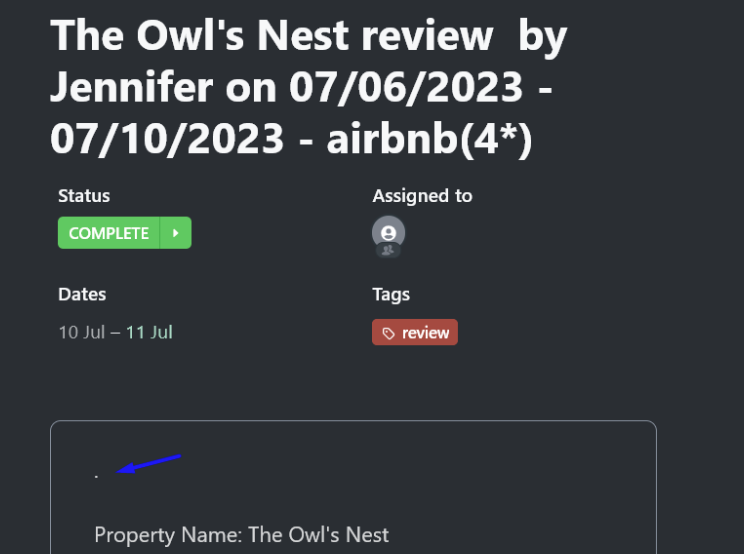
4. The review relates to conditions outside the host’s control: reviews that relate to external conditions, like noise or bad smells coming from neighbors, construction work nearby, and bad traffic, are also deletable. We’ve had people whining about delayed flights and bad restaurants and those also get yanked.
5. The review stems from extortion or manipulation: a negative review that comes from some sort of extortion and blackmailing action, such as threatening a bad review if a discount is not granted. Likewise, actions like “give me a discount, and I’ll give you a good review” are not allowed.
The guest below left a 3-star review for our Smokies Outlook Lodge, but he also planted the seeds of its removal with his threat to leave a bad review if we didn’t refund him.
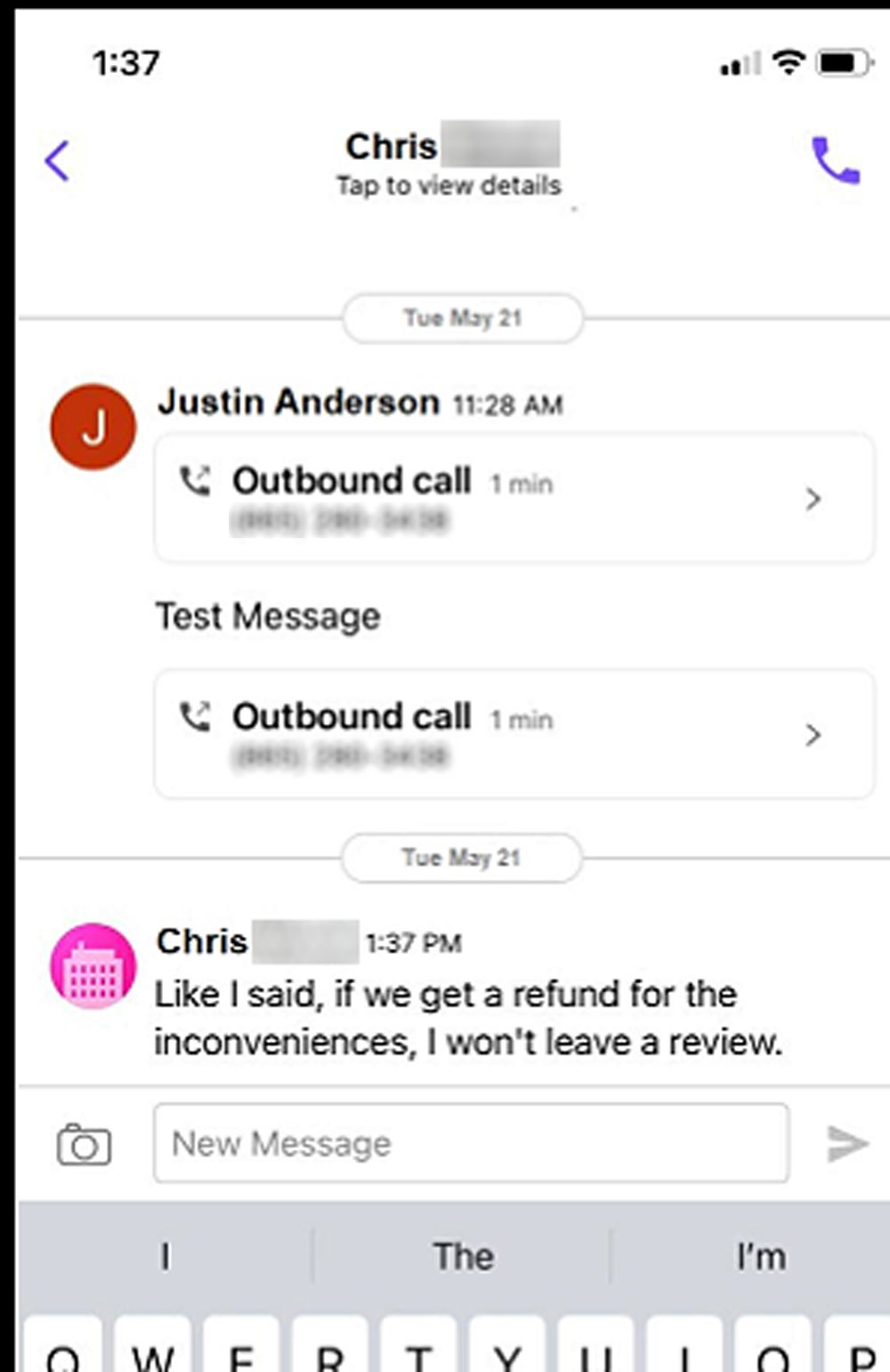
That’s extortion. 

Even when guests are softer in their tone, it’s still against the rules to link financial compensation to a review in any way. Another guest insisted on a refund even if we sent our crew to help her out with pillows and sheets for the pull-out. And she granted us a horrifying 2-star review!
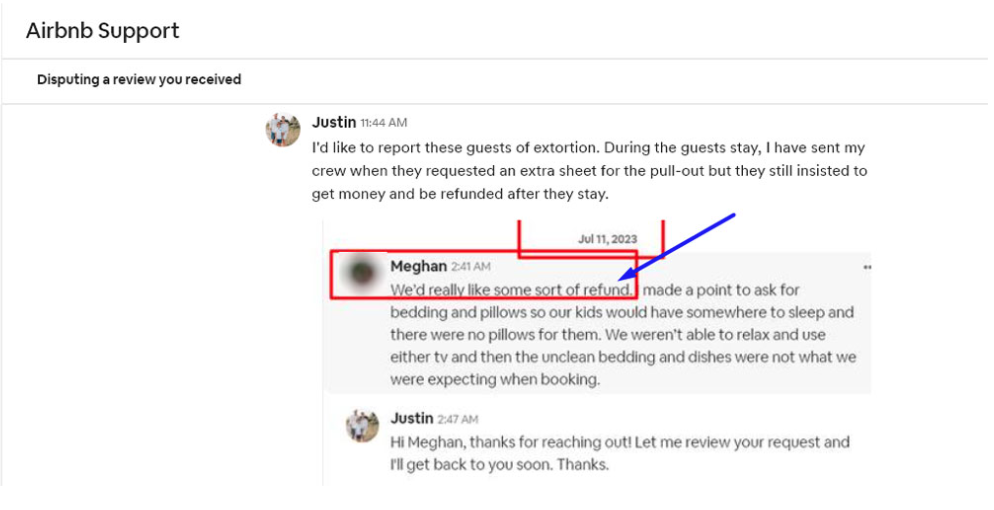
The moderators didn’t like that either.

6. The review is retaliatory: similar to the above, a bad review that comes from a specific situation, like a damage claim from a host or a refund not granted is also deletable. We’ve already received gems like “Only 25 bucks? I’m gonna let my review reflect this.” In general, we love these statements —they show the evidence to get the review yanked.
Our guest William left a damaging 3-star review for our Pinewood Lodge because we requested a photo ID and guest list, as standard. Still, he made our life easier by writing his retaliation proof in capital letters as you can see below. Cheers, Will!
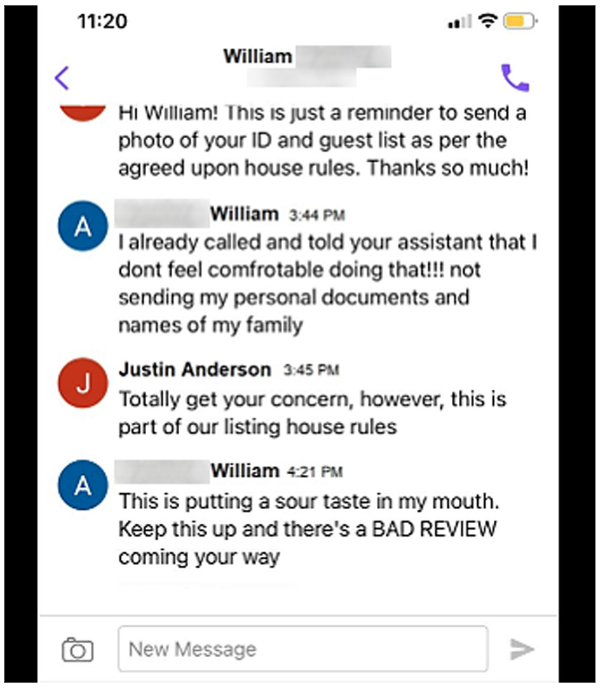
Check what the moderators said:
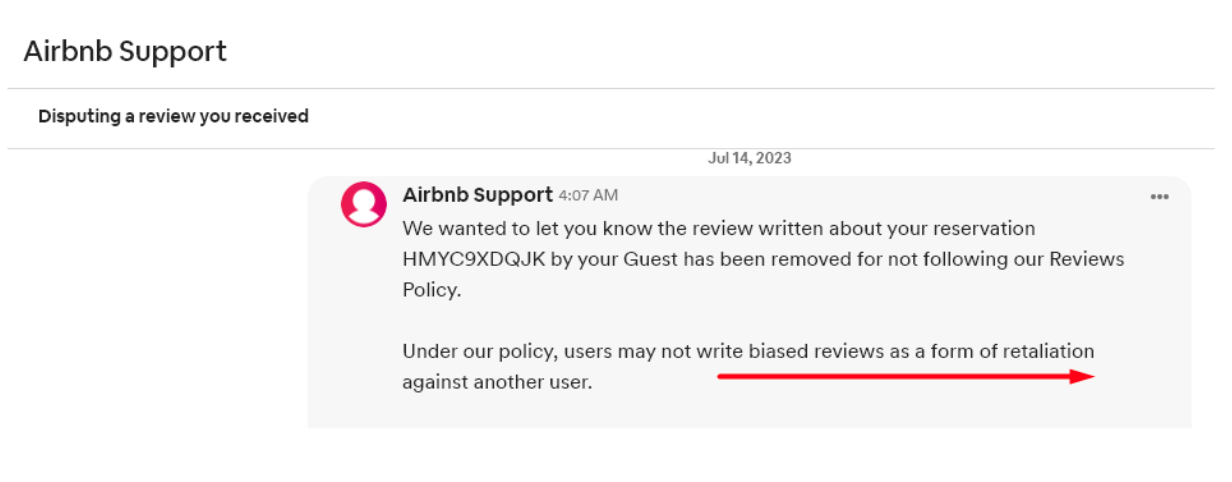
7. The review comes from a guest that never stayed at your property: if the review comes from a guest that never arrived at your place or had to cancel their trip due to circumstances unrelated to you, it is deletable if you provide proof.
8. The review is from a third party: the review comes from someone that never stayed in your place and made the booking for another person. This is against the rules.
9. The review is false: sometimes a review may not be blatantly against the rules, but they are false in one way or another. These are also against the rules, but you need to provide evidence to support your claim.
Getting rid of a bad review?
OTA platforms will usually only remove reviews if they fall under one of the issues mentioned above. So, when you get a bad review that you want to remove, the first thing to do is to check it and identify which of the issues it violates. Second, report it to the platform and always do so with as much detail as possible.
Have in mind that the appraisal of your claims on the platform’s side is a human process made by support agents with the authority to accept or decline them. What one agent may consider suitable for removal, another may not. That’s why it’s important to always state your case clearly and include consistent evidence for your arguments.
We had two unsuccessful attempts to remove this 3-star review below by Dharma. The guest complained about the address being hidden before he made the payment, which is a feature of the platform, and then of our early checkout time, which was clearly stated in our description.
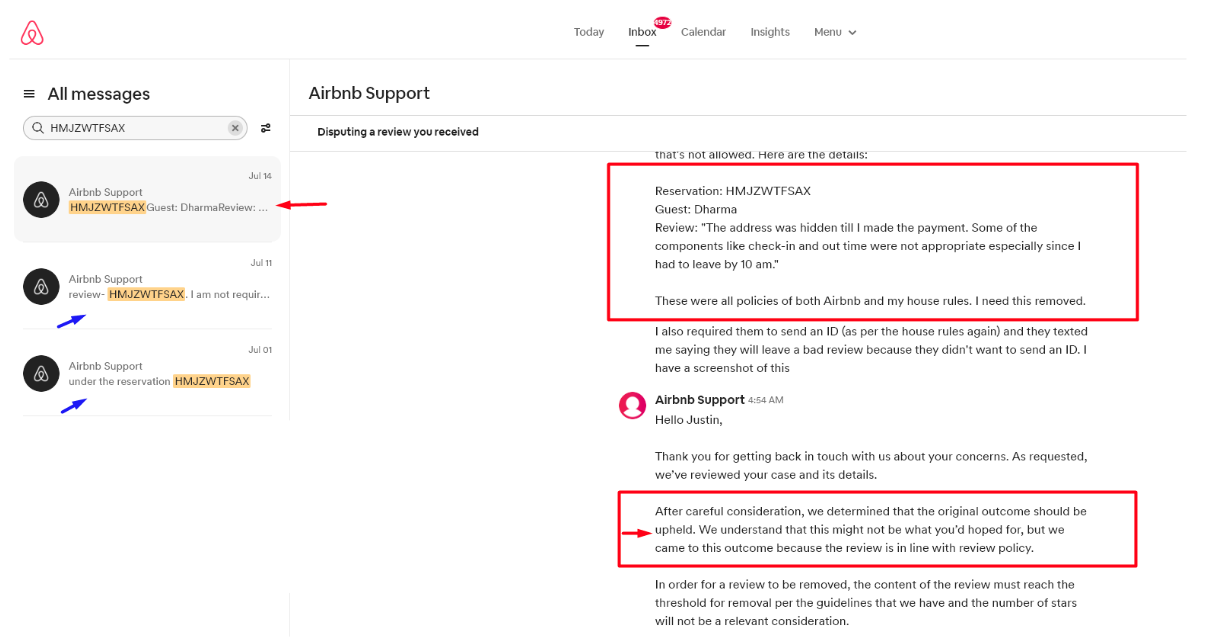
Third time lucky: we managed to successfully have the review removed with the help of a different moderator who proved to be more accommodating. Here’s her verdict:
What if the review is false?
As we’ve seen, it often happens that negative reviews do not contain explicit reasons that make them deletable. These are what we call false reviews. They still violate service and community standards — but you’re the only one who knows it.
If the review is false, you can report it to the OTA’s customer service team. However, unless the review is an obvious exaggeration, you’ll be asked to provide evidence to support your claims, such as photos or videos of your place and screenshots of your communication with the guest.
As a rule of thumb, the more evidence you have the better. That’s another reason for you to always have everything registered in writing and use the official communication channels.
The negative 4-star review below was due to factors out of our control and to a surprise that could have been avoided if the guest had taken the time to skim through the Q&A file we sent to them months before their arrival. Still, we had to make the case to Airbnb moderators in an elaborate message covering every detail.
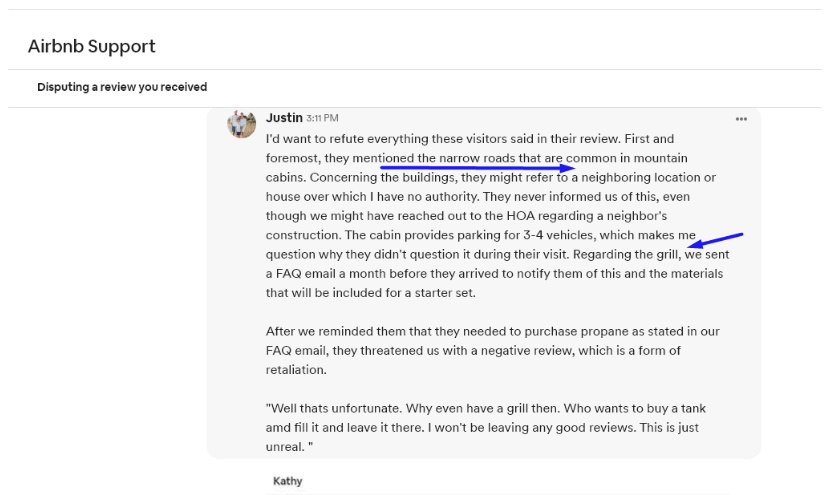
Is it worth the trouble?
We believe that if you have the right to remove a negative review, you should exercise this option. Doing so can help maintain your reputation and overall ratings.
That said, deleting a review can be a time-consuming and stressful process, sometimes taking several weeks. Before you go for it, consider whether the review is damaging enough to warrant the effort. If it’s just a four-star review, and you’re already short in time (and patience), it may not be worth the fight, not to mention that it’s hard to argue a four-star review with the platforms.
Another thing to consider is that when a single bad review is swimming in a sea of outstanding reviews, most people will disregard them, and this also helps to raise your credibility in the eyes of moderators if you try to get it removed.
It goes without saying that if the review is truthful and you’re trying to get it removed, you’re the one being dishonest – your chances will be very low.
What to do if I can’t get it removed?
If your request to remove a review is declined because “allegedly” it doesn’t contradict the platform’s policy, you can appeal. If you’re lucky your case will fall in the hands of another moderator with a different take on it. In any case, always stay polite and refer back to the platform’s rules for removal.
Sometimes, though, you won’t have enough basis, proof, or time to get it removed. That can be frustrating, we know. But that doesn’t mean it’s over yet; there are still actions to take.
Knowing that a bad review influences the decision-making process of potential future guests, you should never simply ignore it. Instead, always try to respond proactively while maintaining a professional tone.
Remember that your responses are out in the world for everyone to read, so use your communication skills and address future concerns. Avoid getting too defensive or taking things personally. It happens that, sometimes, a bad review stems from a simple misunderstanding that you can clarify in your response, politely.
Take a deep breath and carefully analyze the review’s content. Though challenging, always thank the reviewer for their honesty and assure them you will consider their feedback. If possible, draw attention to the positive aspects of your listing.
If there’s something wrong on your end, even if it’s a minor issue, acknowledge it and apologize. Explain the problem and outline your efforts to resolve it. Focus on what you can change rather than harboring negative feelings towards the reviewer or fixating on what went wrong.
Even if a review is extreme, it may still hold some truth to it, and you can reflect on what you can improve to avoid the same issue in the future.
Remember, a bad review doesn’t define your character, but your response does.
How to prevent bad reviews?
In most cases, bad reviews happen when hosts fail to meet expectations. That’s why you should enhance the accuracy of your listing by clearly mentioning both the positive and negative aspects. Moreover, always strive to keep a good communication with your guests through the platform, offering help if any problems arise. Always use the official channels to ensure everything is recorded.
You can also screen potential guests by reading past reviews and paying attention to their tone. Sometimes you’ll find red flags in there.
Deleting negative reviews on Airbnb and other platforms
Dealing with bad reviews is certainly nerve-wracking, but it’s also part of the game. If you can’t get rid of them, make the most of them and move on.
Each new guest is an opportunity to turn things around.
Keep Reading
- Cabin Owner in the Smokies? Here Are Trends, Stats & How to Stand Out Amidst Fierce Competition
- Secrets to Standing Out: Learn From Our Overperforming Cabins in Pigeon Forge & Gatlinburg
- 5 Tips to Secure 5-Star Reviews for Your Cabin on Airbnb and Vrbo
- Five Design Tips to Increase Your Nightly Rental Rates (With a Case Study)



